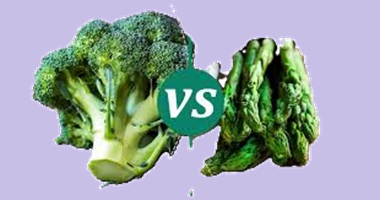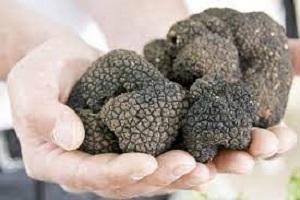Broccoli Vs Asparagus Nutrition
Broccoli Vs Asparagus Nutrition
Asparagus and broccoli are both excellent sources of dietary fiber and potassium.

While asparagus is higher in thiamin, broccoli provides more pantothenic acid.
Additionally, asparagus is a great source of iron.
Which is Healthier: Broccoli or Asparagus? Broccoli Vs Asparagus Nutrition
Both broccoli and asparagus are packed with nutrients, but they offer different health benefits. Here’s a comparison of their nutritional profiles:
Broccoli Vs Asparagus Nutrition: Broccoli Nutrition (per 100g):
- Calories: 34 kcal
- Carbohydrates: 6.6g
- Protein: 2.8g
- Fat: 0.4g
- Fiber: 2.6g
- Vitamin C: 89.2mg (149% DV)
- Vitamin A: 623 IU (12% DV)
- Vitamin K: 101.6mcg (127% DV)
- Folate: 63mcg (16% DV)
- Potassium: 316mg
- Calcium: 47mg
- Iron: 0.7mg
The Broccoli Vs Asparagus Nutrition : Asparagus Nutrition (per 100g):
- Calories: 20 kcal
- Carbohydrates: 3.9g
- Protein: 2.2g
- Fat: 0.1g
- Fiber: 2.1g
- Vitamin C: 5.6mg (9% DV)
- Vitamin A: 756 IU (15% DV)
- Vitamin K: 41.6mcg (52% DV)
- Folate: 52mcg (13% DV)
- Potassium: 202mg
- Calcium: 24mg
- Iron: 2.1mg
Broccoli Vs Asparagus Nutrition Comparison and Key Points:
- Calories: Both are low-calorie options, but asparagus contains fewer calories.
- Protein: Broccoli offers a bit more protein.
- Fiber: Broccoli is higher in fiber.
- Vitamins:
- Vitamin C: Broccoli is a superior source of vitamin C.
- Vitamin A: Asparagus is richer in vitamin A.
- Vitamin K: Broccoli has more vitamin K.
- Minerals:
- Iron: Asparagus is a better source of iron, which is important for preventing anemia.
- Potassium: Broccoli provides more potassium, which is beneficial for heart health.
About Broccoli vs. asparagus
For those of us committed to maintaining or improving our health, it’s well-known that aiming for five servings of fruits and vegetables daily is essential.
These foods provide our bodies with vital vitamins, fiber, antioxidants, and numerous other nutrients.
But when we look a bit closer, comparing the nutritional value of specific foods can be quite revealing.
Take broccoli and asparagus, for instance—which one is healthier?
In the springtime, broccoli and asparagus are plentiful at local grocery stores and farmers’ markets, and they’re available year-round in larger supermarkets.
Both green vegetables are highly praised for their nutritional content and benefits, but they also have their unique qualities.
Let’s examine each vegetable individually:
Broccoli
This crunchy member of the cruciferous vegetable family may have a reputation for being unpopular with some picky eaters, but it offers numerous health benefits.
Whether enjoyed raw with your favorite dip, tossed into salads, or added to pita pockets with micro greens and hummus, broccoli is versatile. It can be steamed, baked, or flash-fried.
Here are some of its health perks:
- Broccoli is an excellent source of fiber, which helps prevent certain diseases.
- It’s rich in Vitamin C and Vitamin K.
- Packed with antioxidants and plant compounds like sulforaphane, broccoli may help reduce the risk of certain cancers.
- It also contains nutrients that support eye health.
Asparagus
These slender stalks herald the arrival of spring in the sandy fields of rural Michigan.
Thanks to cold storage, locally grown asparagus remains fresh and ready for purchase well into summer.
These fast-growing perennials offer many nutritional benefits. Asparagus can be enjoyed raw in salads, or grilled, steamed, or pan-fried.
Some of its benefits include:
- Asparagus is a low-calorie, low-fat food that’s high in fiber. Eating fiber-rich foods helps you feel full after a meal, which aids in weight loss, according to studies.
- It’s a good source of Vitamin K, which is crucial for bone health and blood clotting.
- The B vitamins in asparagus may act as mood enhancers, making it a vegetable that also benefits mental health.
The Bottom Line: Broccoli Vs Asparagus Nutrition —which is Healthier?
Both of these vegetables are incredibly healthy, with the key differences lying in their varying nutrient levels.
If you want to boost your intake of a particular vitamin or nutrient, choose the vegetable that offers the highest value per serving.
- Broccoli: Ideal for boosting your intake of vitamin C, fiber, and potassium.
- Asparagus: Lower in calories, packed with vitamin A and iron, and a good source of folate.
Incorporating both vegetables into your diet will help you enjoy the full spectrum of their nutritional benefits.

FAQs
Reheating asparagus without it turning to mush
If your asparagus turns mushy when you reheat it, it was likely overcooked initially. Here’s a better method:
snap off the tough ends of the asparagus, wash them, and set aside. Heat a pan and melt some butter in it.
Add the still-damp asparagus, sprinkle with a pinch of salt, and sear for a couple of minutes.
Then, pour in a ladleful of water, cover the pan with a lid, and cook for 5–6 minutes.
If any water remains at the bottom after cooking, increase the heat to let it evaporate.
For any leftovers the next day, reheat the asparagus in the pan.
Crack an egg over the top, season with a pinch of salt and a dash of black pepper, and cover with a lid.
Once the egg is cooked to your liking, serve with a sprinkle of freshly grated Parmigiano Reggiano.


